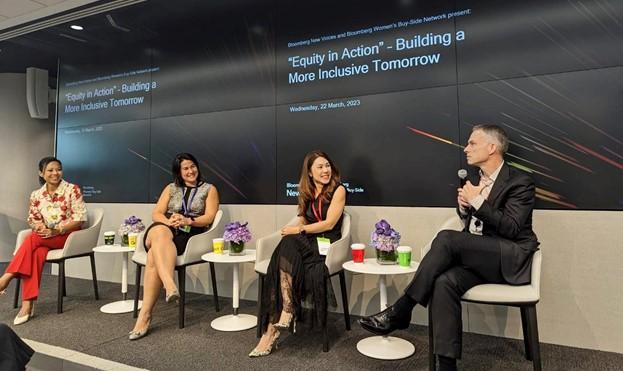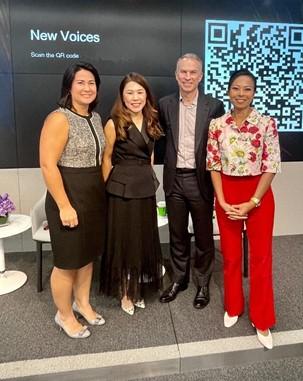“Equity in Action” – Building a More Inclusive Tomorrow
Leaders from MUFG Bank, Nikko AM and Google discuss how to champion greater equity in the workplace, challenges to be addressed and how men and women can come together to create lasting change
Originally published on bloomberg.com
In celebration of International Women’s Month, Bloomberg New Voices (a Bloomberg News initiative) and the Bloomberg Women’s Buy-Side Network (BWBN) Singapore chapter recently organized “Equity in Action” – Building a More Inclusive Tomorrow, an in-person event to discuss proven practices that foster a culture of equity.
Moderated by Haslinda Amin, Chief International Correspondent for Southeast Asia and anchor for Bloomberg Television, the panel also featured leaders across a diverse set of corporates:
- Angelina Bopp, Managing Director, Head of Credit Managed Assets, Global Corporate and Investment Banking for Asia Pacific, MUFG Bank, Ltd
- Eleanor Seet, President and Director, Head of Asia ex-Japan Nikko AM Asia Ltd, Nikko AM
- Scott Beaumont, President, Asia-Pacific, Google
The difference between Equality and Equity
‘Equality’ and ‘equity’ are two terms commonly used in gender related discussions, often interchangeably. While both words are rooted in definitions around fairness, they inherently mean different things. As a result, how we apply them can also produce vastly different outcomes.
In the workplace, equality is providing all employees with the same tools to succeed. Equity is providing each individual the resources they need to thrive.
Panelists shared how they are approaching Diversity, Equity and Inclusion (DEI) within their own organizations:
- Scott outlined some of the ways Google is equalizing the playing field, and helping employees gain the skills and resources they need to thrive and succeed in their work. He emphasized the importance of surfacing issues that may be hindering people from having equal experiences, as well as having regular internal dialogues on DEI to develop shared empathy and understanding.
- Angelina discussed how MUFG is “creating a culture of inclusivity and welcoming individual thoughts and contributions”. She added that MUFG is putting equity into practice by creating space for individuals to speak and have their voices heard, driving both thought and team diversity.
- Eleanor noted that the mindset of being ‘Global Citizens’ is ingrained in Nikko AM’s DNA. The company strives for equal opportunities for all employees, recruiting and rewarding based on meritocracy. As a leader fueling employee and business growth, she makes it a priority – and a mandatory element of company culture – to address unconscious biases.
Despite the differences between their businesses, MUFG, Nikko AM, and Google are committed to creating equity through policies and practices. The speakers recognized that the pursuit of equity and equality comes with distinct responsibilities and complexities, and that leaders must embrace these challenges, especially since DEI is always evolving.
Bringing DEI to life – an evolutionary journey
When it comes to achieving equity in the workplace, there is no one-size-fits-all playbook for leaders to follow, but the panelists were unanimous in their agreement – it is a journey with no hard end goal because there’s always more that can be done.
- Eleanor revealed Nikko AM’s size has allowed them to be nimble and advocate equity in a non-linear way, for each market. She illustrated the company’s ability to be flexible and cater to unique employee requests and adapting policies to retain talent, because every individual’s circumstances are different.
- Scott discussed how Google strives to create a sense of belonging by building an inclusive culture with diverse perspectives that betters the workplace, society, and their products. He observed that as a result of engaging in deep conversations with employees on gender, mobility, and minority issues, Google’s leaders have developed stronger empathy and introduced policies to address unique needs.
- Angelina shared that equality is the goal, but equity is the means to get there. “Treating people equitably means considering their individual needs and supporting them in specific situations to achieve equality.” She acknowledged that large organizations with established policies may adopt top-down DEI strategies out of necessity, which could limit their ability to be more agile on nascent policies. On the other hand, small- to mid-sized companies may find that bottom-up initiatives better suit the needs of their employees and communities.
Regardless of the size, structure or culture of an organization, the speakers emphasized the importance of continuously evaluating DEI strategies to ensure they are effective and meet the needs of their employees.
Key Performance Indicators (KPIs) in DEI
Panelists shared their different points of view on whether KPIs were effective – or necessary – for DEI.
- Angelina believes that a culture of inclusivity should be intrinsic and not just incentivized by KPIs. She expressed that having the right people in the right roles creates the right culture. She shared that “culture is what you do when no one is watching,” and MUFG strives for their employees to be impactful and serve their communities.
- Scott explained how pursuing ‘belonging’ and making it a core part of Google’s culture and mission, has given employees clear guidelines on how to engage, raise concerns, and support one another in a respectful and inclusive environment. He detailed how setting clear DEI targets has helped Google progress, together with identifying manager attributes that guide them to build an environment of respect, inclusion, and equitable outcomes.
- Eleanor is of the view that having a consistent culture of inclusion and diversity helps Nikko AM develop sustainable KPI metrics. By setting a high bar on DEI indexes for themselves, the company culture progresses forward organically. She also stressed the value of an entrepreneurial spirit in Nikko AM’s culture that encourages teamwork and innovation.
Playing our part in progressing greater equity in the workplace
Speaking from experience, the panelists provided actionable advice on how to promote a more inclusive and equitable work culture, from an organizational to individual level.
- Workplace: Companies can offer employees reskilling and lifelong learning opportunities across all levels in different sectors to foster career growth and development. In industries facing a talent crunch, companies could explore piloting a program that encourages underrepresented groups to return to the workforce.
- Male allies: Gender equality takes both genders. Men can be better allies to women in the workplace by creating equal opportunities for all. By finding ways to actively champion and promote their fellow female colleagues and walking the talk, men can contribute towards a more inclusive and diverse workplace.
- Individuals: Each one of us can create a safe space for our colleagues and teams to feel comfortable to express their opinions and concerns. Actionable examples include actively inviting others into the conversation to ensure all views are captured.
Leaders also play a crucial role in putting equity and parity on the agenda, but it takes a joint effort to push and sustain DEI in the workplace. The speakers at the event all agreed that if we champion equity daily as a collective, we will be able to build a brighter, more inclusive tomorrow.
If you would like to join the BWBN Singapore chapter and stay updated on its events and activities, please visit https://www.bloomberg.com/company/values/diversity-and-inclusion/advancing-women/expanding-opportunity/bloomberg-womens-buy-side-network/.
About BWBN
The Bloomberg Women’s Buyside Network (BWBN) is a global network led by a group of senior industry leaders who aspire to serve as role models for the next generation of women on the buy-side. As the first women’s buy-side network of its kind, it was created to advance the social purpose of the industry and spotlight its leading practitioners. The network promotes meritocracy and inclusion in the industry, and educates on the diversity of career paths within the buy side.
The network started in Asia in 2018, with chapters opened in Singapore, Hong Kong, India and Japan. From 2021, the network expanded globally with chapters added in Australia, New Zealand, California, New York and Brazil.
About Bloomberg New Voices
The New Voices initiative, started in 2018, has helped triple the percentage of on-air female guests on Bloomberg TV to 30% as of the end of last year. The initiative has also sponsored intensive one-on-one media training to more than 370 executives around the world and created the definitive global database of female sources in the industry with more than 7,600 names. We are eager to celebrate these successes and share our expansion plans to further elevate the expert opinions of women and under-represented executives in the year ahead.
For more information about Bloomberg New Voices, visit: www.bloomberg.com/newvoices



